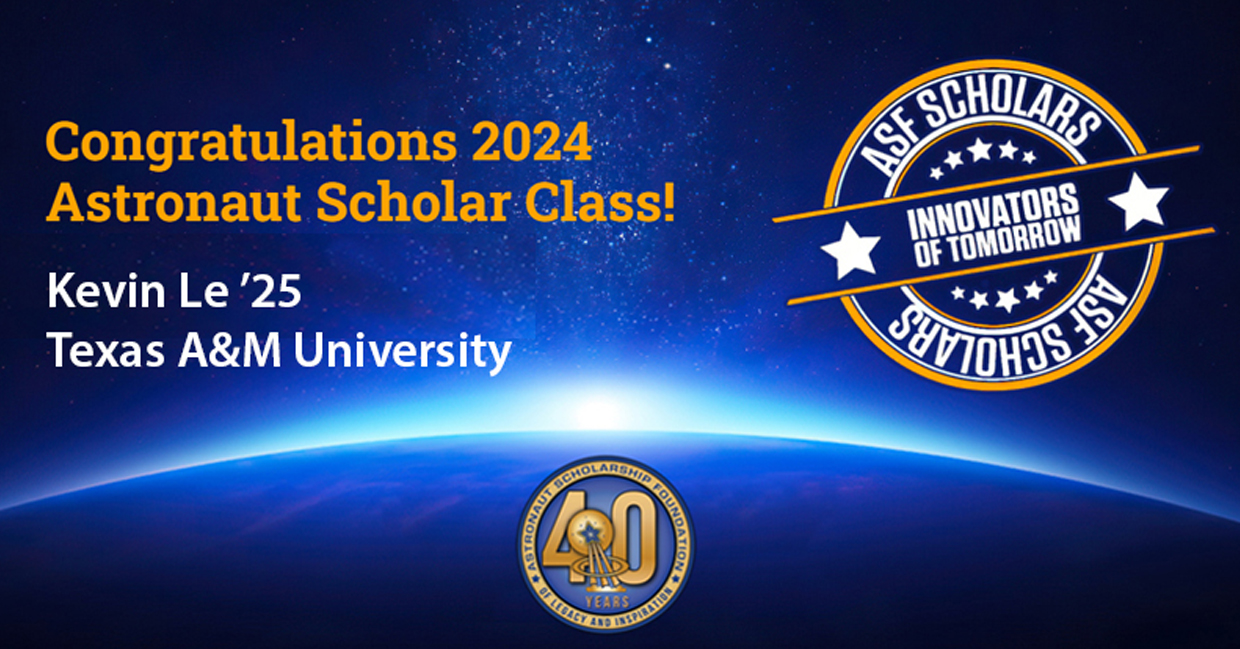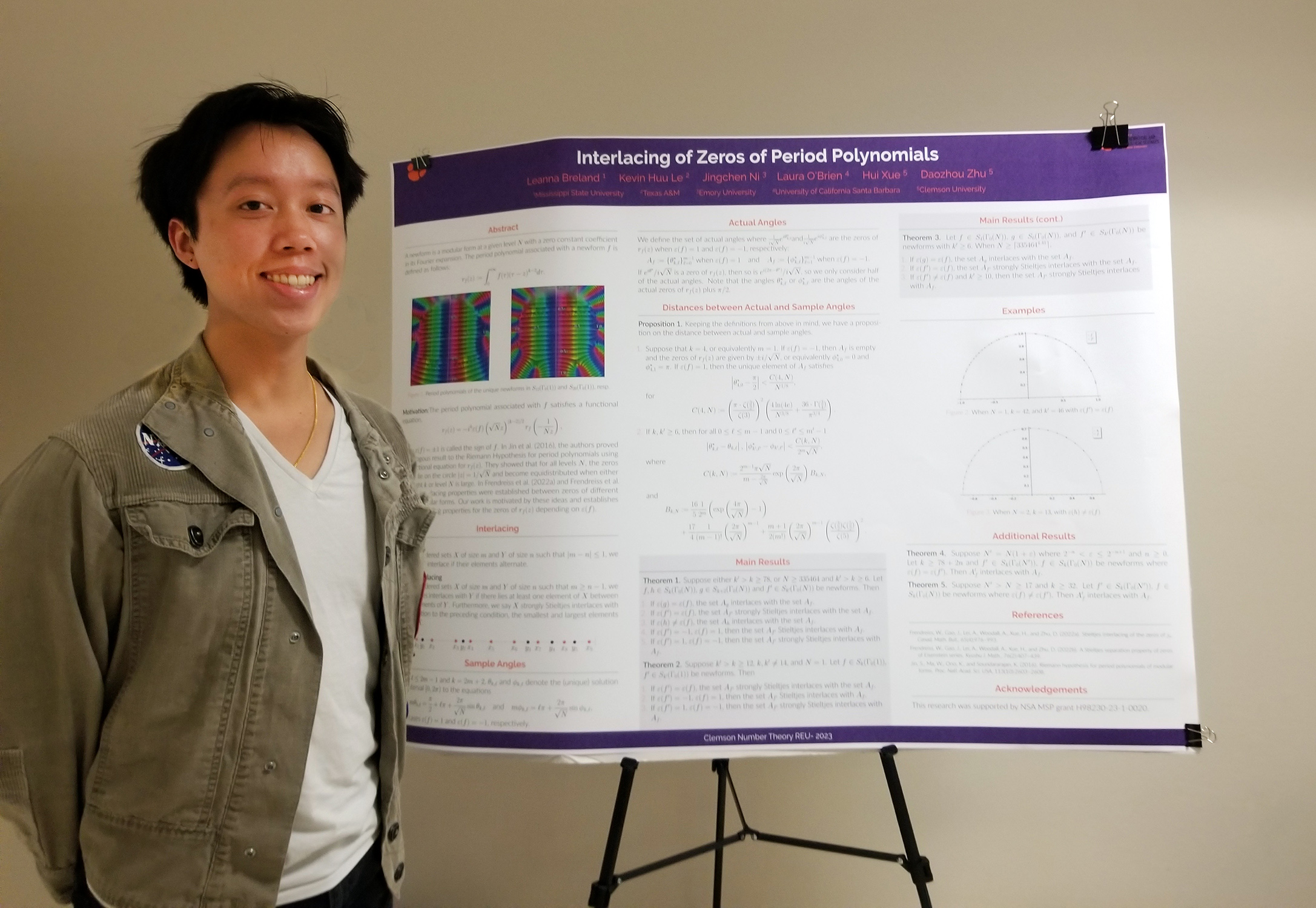
Texas A&M University junior Kevin Le ’25 has been selected to receive a $15,000 scholarship from the Astronaut Scholarship Foundation (ASF).
Le, a native of Austin who is pursuing a bachelor's degree in mathematics, is one of three 2024 Texas A&M recipients along with junior biomedical engineering major Amanda Galloway ’25 of Katy and junior honors electrical engineering major Annalaine Whitson ’25 of The Woodlands.
The 2024 Astronaut Scholars class includes 71 students from 48 different partnering universities across the nation. Each was selected based on demonstrated initiative, creativity and excellence in undergraduate research and academics in their fields as well as their potential to become leaders in their scientific and professional pursuits.
Le and his fellow Texas A&M Astronaut Scholars will be presented with their awards as part of a fall campus ceremony featuring former astronauts and co-sponsored by Texas A&M LAUNCH along with the Astronaut Scholarship Foundation. Prior to that, they will be formally recognized at the Innovators Symposium & Gala, set for Aug. 14-17 in Houston. The event also will feature a technical conference where Astronaut Scholars are invited to present their research.
Le says he fell in love with mathematics during his high school years and never looked back, fully immersing himself in all the discipline has to offer as an undergraduate in Aggieland. In addition to serving as president of the Texas A&M Math Club and giving back to both the university and community through volunteer work, Le has been involved in several research projects during the past two years. His most recent one under the direction of Dr. Matthew Young in the Department of Mathematics focused on representation theory, a subfield of mathematics that uses linear models to study abstract algebraic spaces — work which he is continuing this summer at the University of Michigan as a participant in his second consecutive National Science Foundation-funded Summer Research Experiences for Undergraduates (REU) program.

Le credits the challenging atmosphere of undergraduate research for teaching him patience as well as how to overcome setbacks and describes it as one of his favorite parts of college thus far. His research has already resulted in multiple publications, including two papers set to be published later this year. The first, which will appear in Springer Proceedings, stems from his 2023 Polymath Jr. Research Experience on number theory, while the second, to be published in the Journal of the Mathematical Society of Japan, is based on his prior 2023 NSF Summer REU at Clemson University. He and his collaborators presented on the latter research at the 2024 Joint Mathematics Meetings in January as part of the American Mathematical Society-Pi Mu Epsilon Undergraduate Student Poster Session.
After graduation, Le plans to pursue a Ph.D. in pure mathematics, thanks in part to his Astronaut Scholar award that will enable him to devote more time to research and classes.
For the past 40 years, the Astronaut Scholarship Foundation has identified and supported the best and brightest undergraduate students pursuing educations in STEM (science, technology, engineering and mathematics) fields across the nation. The Astronaut Scholarship is known for being among the most significant merit-based scholarships awarded to undergraduate STEM students. Candidates must be nominated by faculty of the participating universities based on their display of initiative, creativity and excellence in their chosen field.
In addition to a scholarship and membership in the Astronaut Scholar Honor Society, all award winners have ongoing opportunities to engage in networking and mentoring opportunities with astronauts, Astronaut Scholar alumni and industry leaders. They also enjoy lifelong membership and participation in the Michael Collins Family Professional Development Program.
Since the scholarship’s inception in 1986, Texas A&M has had 42 honorees, including 18 from the College of Arts and Sciences: Le (2024); Kevin Yao (computer engineering and mathematics, 2022); Cosmas Kravaris and Ryan Rahman (applied mathematics/statistics and biology, 2021); Johnathan Lo (molecular and cell biology/statistics, 2020); Oscar Gonzalez (chemistry, 2019); Ashley Hayden (biology, 2018); Brooke Versaw (chemistry, 2017); Kristin Maulding and Will Linz (molecular and cell biology and applied mathematics, 2015); Amelie Berger (environmental geoscience, 2014); Dillon Amaya (meteorology, 2013); David Rahmani (physics, 2009); Susan Koons (applied mathematics/psychology, 2008); Justin Wilson (mathematics/physics, 2005 and 2006); Benjamin Aurispa (mathematics, 2004); John Stewart IV (physics/mathematics, 2002 and 2003) and Phyllis McAdoo (geophysics, 1992).
The Astronaut Scholarship Foundation was established in 1984 by the six surviving Mercury 7 astronauts to aid the United States in retaining world leadership in the development of cutting-edge science and technology. Today, more than 100 astronauts from the Mercury, Gemini, Apollo, Skylab and Space Shuttle programs have joined in the mission, resulting in more than $9 million in scholarships awarded to more than 800 of the nation’s top scholars as well as technological innovations across the healthcare, energy, defense, aerospace and homeland security sectors.
For more information on the Astronaut Scholarship and other national and international awards recognizing student academic achievement, please see the National Fellowships section of the LAUNCH website.